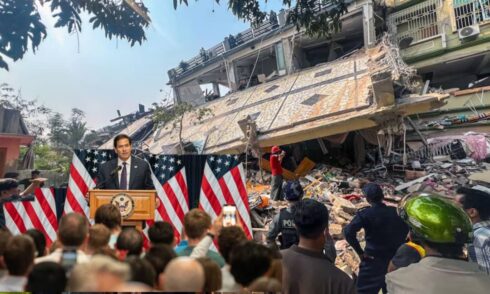U.S. Secretary of State Marco Rubio has forcefully dismissed growing criticism that the United States was unable to respond effectively to Myanmar’s devastating 28 March earthquake due to the Trump administration’s dismantling of its primary humanitarian aid agency. Speaking to the BBC on the sidelines of a NATO meeting in Brussels, Rubio argued that the U.S. is “not the government of the world,” asserting that other wealthy nations should contribute more in such global crises.
Responding to questions over why Washington had not sent its usual contingent of search-and-rescue personnel and aid equipment, Rubio said the United States has “other needs” and “other priorities” that must be balanced against global humanitarian missions. “We’re going to do our part,” he said. “We already have people there. We’ll have more people there. We’ll help as much as we can. [But] it’s not the easiest place to work… they have a military junta that doesn’t like us.”
The remarks came amid increasing pressure on the U.S. government, with critics pointing to the recent shuttering of the United States Agency for International Development (USAID) under the Trump administration as a key reason for the delayed response.
Former Officials Blame Agency Cuts for Inaction
Former USAID officials told the BBC that the U.S. was hamstrung in its ability to deploy a large-scale disaster relief effort because of deep cuts to the agency orchestrated by billionaire Trump adviser Elon Musk. These cuts, carried out through Musk’s so-called Department of Government Efficiency (Doge), reportedly eliminated critical logistics contracts and dismissed experienced officials responsible for coordinating responses like those needed in Myanmar.
According to these officials, the U.S. traditionally deploys up to 200 emergency responders, complete with sniffer dogs and heavy rescue equipment, within hours of major international disasters. In the aftermath of the 7.7-magnitude quake, however, only three American advisers were dispatched from a nearby regional post.
“The White House tried to send a DART [Disaster Assistance Response Team], but the necessary contracts and infrastructure were no longer in place,” said one former USAID staffer. “Lives were lost because the system designed to save them was dismantled.”
Rising Death Toll and Global Relief Efforts Highlight U.S. Absence
Myanmar’s ruling military announced on April 4 that the confirmed death toll from the earthquake had risen to 3,354, with more than 4,500 injured and over 200 people still missing. International aid has begun pouring into the country, with China and India among the first to send in relief teams and medical personnel.
Rubio acknowledged the gravity of the crisis but emphasized that humanitarian access was also hindered by Myanmar’s military regime. “That would have impeded our response, no matter what,” he insisted. “We are willing to continue to help in the humanitarian crisis. Other countries need to do so as well. China is a very rich country. India is a rich country. Everyone should pitch in.”
Still, critics argue that despite the junta’s history of hostility toward Western nations, USAID had previously maintained access even in politically tense environments, due in part to its non-partisan reputation and extensive local networks.
Rubio Targets NGOs and Defends Shift in U.S. Aid Strategy
In a sharply worded rebuke of global NGOs, Rubio accused many large aid organizations of profiting off U.S. taxpayer dollars while delivering little in return. “These are people that make millions and hundreds of millions of dollars in these NGOs all over the world,” he said. “We’re not going to fund these global NGOs… that are living off of this. We are prepared to help and work with governments and appropriate NGOs on the ground that are delivering assistance.”
Rubio insisted that the U.S. is not abandoning humanitarian efforts but is instead refocusing on direct partnerships and accountability. “We will be there, and we will be helpful. But there are a lot of other rich countries—they should also pitch in and help… we are going to do our part,” he reiterated.
The comments suggest a continued shift in U.S. foreign policy philosophy under Trump-era holdovers, away from large-scale global aid operations and toward a more selective, national interest-driven model.
International Community Reacts as U.S. Influence Wanes
Global observers have expressed concern that America’s absence in Myanmar’s time of need signals a broader retreat from its historic leadership in disaster response. European and Asian diplomats, speaking off the record, said Washington’s delayed and limited engagement risks ceding ground to China and India, who are rapidly filling the vacuum with swift humanitarian deployments.
Former USAID officials warn that the loss of institutional capacity is not easily reversible. “This isn’t just about one earthquake,” said one former deputy director. “It’s about losing the capability to lead, to inspire, and to save lives when it matters most.”
As the humanitarian situation in Myanmar unfolds and questions mount about the long-term impacts of U.S. policy shifts, Rubio’s remarks have only deepened the divide between former officials, aid workers, and the current leadership on how the United States should engage with the world in times of crisis.














